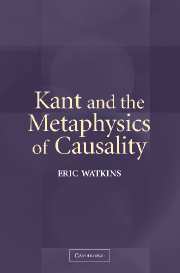Introduction
Published online by Cambridge University Press: 12 January 2010
Summary
The goal of this book is to present a comprehensive account of Kant's views on causality in their proper historical context. Since what I take that context to be departs from the standard view in significant ways, in the first part of this introduction I sketch the familiar contours of the standard view and present very general historiographical and historical reasons that show why we might consider rejecting central aspects of such a view. I also suggest that we can discern the main features of a more adequate account by approaching the topic in a fuller, contextualist manner. In the second part of this introduction I summarize each chapter in this book, illustrating how such an approach makes it possible to provide a more satisfying historical and philosophical account of Kant's central views on causality.
Within general histories of modern philosophy, one can find a narrative concerning the specific issue of causality whose main story line is repeated with remarkable consistency, even if it is embellished on each occasion with slightly different details. Told in the most general of terms, the story is that philosophers in the early modern period, such as René Descartes and John Locke, attempted to articulate a novel metaphysical account of causality that could support the claims of the “new sciences” of mathematical physics and corpuscularianism discovered by Galileo Galilei, Isaac Newton, and Robert Boyle. Descartes and Locke, as the founders of radically opposed views within modern philosophy (“rationalism” and “empiricism,” respectively) disagreed about many substantive issues, such as the existence of innate ideas and the role of sensations, but their accounts of causality nonetheless revealed remarkable similarities (due in part to the fact that they shared a common opponent, namely medieval and early modern Aristotelians).
- Type
- Chapter
- Information
- Kant and the Metaphysics of Causality , pp. 1 - 20Publisher: Cambridge University PressPrint publication year: 2004



